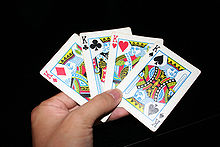Ninety-nine (addition card game)
 |
|
| Type | Addingup-type |
|---|---|
| Players | 2+ |
| Cards | 52 (additional decks may be used) |
| Deck | Anglo-American |
| Play | Clockwise and Counter-clockwise |
| Card rank (highest to lowest) | K Q J 10 9 8 7 6 5 4 3 2 A |
| Playing time | 15 min. |
| Random chance | Low-Moderate |
| Related games | |
| Switch | |
Ninety-nine is a simple card game based on addition and reportedly popular among gypsies. It uses one or more standard decks of Anglo-American playing cards in which certain ranks have special properties, and can be played by any number of players. During the game, the value of each card played is added to a running total which is not allowed to exceed 99. A player who cannot play without causing this total to surpass 99 loses that hand and must forfeit one token.
Due to the simple strategy and focus on basic addition, the game is ideal for culturing math skills in children. This is also true because the new total must be called out on each play, lending enjoyment to more expressive children and assertiveness practice to others.
At the start of the game, three tokens are distributed to each player. Each hand, three cards are dealt to each player, and the player to the left of the dealer takes the first turn by choosing one of the cards in their hand, places it on the discard pile, calls out its value, and then draws a new card. The player to the left then chooses one of their cards and places it on the discard pile, adds its value to the previous card and calls out the new total. If a player forgets to draw a new card before the next player plays, that player must remain one card short for the remainder of the hand. Play proceeds in this manner until a player cannot play without making the total value greater than ninety-nine. That player must turn in one of his or her tokens, all cards are then collected and a new hand is dealt. Any player without tokens loses and is out of the game, while the last player remaining with token wins. A variation is to play with dollar bills, instead of tokens. The dollar bill is folded instead of giving a token. Five folds are allowed: all corners, then in half and after that player is out. The final player wins all the dollar bills.
Cards of certain ranks have special values or properties, which are:
Queens and Jacks are worth 10, Aces are worth 1 or 11, while all other cards have their face value.
Alternate rules allow use of the Joker cards and rank the cards as follows:
Queens and Jacks are worth 10, Aces are worth 1 or 11, while all other cards have their face value.
Another variation from Chicago, IL ...
Hawaii variation
Michigan variation Any time a player gets three of kind, he can lay it down, call out and all the other players have to fold a corner of the dollar bill. The hand is ended and the next one is dealt. Also, when one player cannot play because the score is 99, he drops out and play continues with the remaining players.
...
Wikipedia
